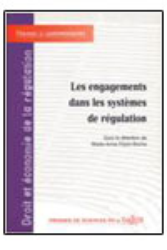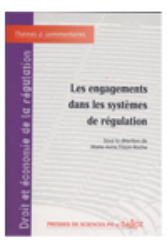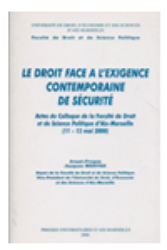March 24, 2021
Compliance: at the moment

Feb. 9, 2021
Conferences

Full reference : Frison-Roche, M.-A., Devoir de vigilance des entreprises : vers un Droit de la responsabilité ex ante ? (Duty of vigilance for companies: towards an ex ante liability law?), conference-debate, The Faculty of Law, University of Oslo, Norway, 9th of February 2021.
The conference-debate is moderated by Catherine Banet, Associate Professor, Scandinavian Insitute of Maritime Law, Department of Energy and Resources Law, University of Oslo

Jan. 6, 2021
Publications

Référence complète : Frison-Roche, M.-A., Environnemental Compliance Law, as an Ex Ante Responsability, for an annexe in a French Report on the liability for the environmental Damages, for the European Commission, janvier 2021.
_____
Aug. 11, 2020
Newsletter MAFR - Law, Compliance, Regulation

Full reference: Frison-Roche, M.-A., Against money laundering, what time matters? Does it work, between ExAnte and ExPost? (BIL case), Newsletter MAFR - Law, Compliance, Regulation, 11th of August 2020
Read, by freely subscribing, the other news in the Newsletter MAFR - Law, Compliance, Regulation
Summary of the news
The activity of money laundering is detrimental not only in itself but also because it permits the development and the sustainability of other criminal activities such as drug trafficking, weapon trafficking or human beings selling. Fighting against money laundering could permit to indirectly fight against these underlying activities, by the way very difficult to fight. Thus, the fight against money laundering has become a "monumental goal", which justifies the adoption of tools sometimes much more powerful than those used by classical criminal Law. For the sake of efficiency, the legal obligation to prevent money laundering is given to every body able to do it, as banks, real estate agents or gaming society, under the penalty of sanction.
On 10th of August 2020, the Luxembourgish financial market supervisor convicts the International Bank of Luxembourg to pay a fine of 4,5 millions of euros because of weaknesses detected in its process of fight against money laundering. However, when the sanction has been pronounced, the bank had already remedied the weaknesses identified. It is important to observe that what is important for Compliance Law, it is not that a non compliant behavior is punished but rather that the crucial firm modifies its behavior in order to being more efficient in the realization of the "monumental goal", only concern of the public authority. Thus, an Ex Post sanction against the crucial operator is not an end in itself and can be justified only if it permits to incite the crucial operator to act or rather to desincite to do anything. Compliance Law is an Ex Ante legal system.
To go further, read:
- Frison-Roche, M.-A., Le couple Ex Ante - Ex Post, justificatif d'un droit spécifique et propre de la Régulation, 2006 (in French)

April 24, 2020
Publications

Its subject is the confrontation between the current health crisis situation and the Compliance Law.
Summary. After defining Compliance Law, distinguishing the procedural and poor definition and the substantial and rich definition, the starting point is to admit the aporia: the type of health crisis caused by Covid-19 will be renewed and it is imperative to prevent it, even to manage it, then to organize the crisis exit. Public Authorities are legitimate to do so, but because this type of crisis being global and the State being consubstantially linked to borders, States are hardly powerful. Their traditional International Law shows their limits in this current crisis and one cannot hope that this configulration will improve radically.
In contrast, some companies and markets, notably the financial markets, are global. But the markets are not legitimate to carry out such missions and counting on the generosity of certain large companies is far too fragile in front of the "monumental goal" that is the prevention of the next health crisis, crisis which must never happen.
How to get out of this aporia?
By Compliance Law, basis of, in a literal and strong sense, the "Law of the Future".
We need to be inspired by the Banking and Financial Compliance Law. Designed in the United States after the 1929 crisis to tend towards the "monumental goal" of the absence of a new devastating crisis in the country and the world, this set of new legal mechanisms gave duty and power of supervision, regulation and compliance to market authorities and central bankers. These are independent of governments but in constant contact with them. Today, they claim to have as first priority the fight against climate change. Now and for the future, they must also be given the responsibility and the powers to prevent a global health disaster, similar to a global ecological disaster, similar to a global financial disaster. This does not require a modification of the texts because their mandate consists in fighting instability. Stability must become a primary legal principle, of which the fight against monetary instability was only a first example. By the new use that central banks must make of it by preventing and managing health crises, Compliance Law will ensure that the future will be not catastrophic.

Jan. 17, 2020
Publications

This Working Paper written in English is the basis for an article published in French in the French journal Dalloz Avocat , in March 2020.
Summary of the working Paper.
If we perceive Compliance Law as an aggression of the private company and a binding set of mechanisms that have no meaning and added value for it, then the attorney has a utility: defending the business. It can do so not only during the sanctions phase, but also to prevent it.
But this function is not central.
It becomes so if we understand Compliance Law as a body of substantial rules, pursuing a "monumental goal": the protection of the person, goal injected by political bodies and taken up by the operator. From this, the company must convince everyone to take it back, inside the company and outside. In a general and contradictory debate, the attorney carries this conviction, because he and she is always convincing those who at the end judge (market, public opinion, etc.) that is their raison d'être.
(In this short document, the pop-ups refer to the different works that develop each of the points)
Oct. 22, 2010
Publications

► Référence complète : M.-A. Frison-Roche, " Ex ante - ex post, justicacion de un derecho proprio y especifico de la regulacion", Revista de Responsabilidad civil y seguros, pp.3-13, LA LEY ed., 2010.
____
► Résumé en français de l'article (rédigé en espagnol) : L'analyse économique du droit utilise très fréquemment la distinction "ex ante/ex post " pour opposer le droit qui intervient avant que la situation ou la difficulté ou le fait générateur n’advienne, alors que l’ex post désigne une intervention juridique une fois que ceux-ci sont constitués. C’est pourquoi on affirme souvent que la Régulation est ex ante alors que le droit de la concurrence est ex post. Mais c’est réduire la Régulation à la réglementation qui seule est ex ante, alors que le régulateur dispose de nombreux pouvoirs ex post. En outre, par le mécanisme de la jurisprudence et les stratégies anticipatrices des agents économiques, toute décision ex post constitue un "ex ante cognitif". Cet article, écrit en espagnol, reprend la démonstration pour montrer la dialectique entre l’ex ante et l’ex post, dont les rapports entre l’assurance, mécanisme justifié parce que l’agent sait qu’il peut être responsable (ex ante cognitif), et la responsabilité civile, sont le meilleur exemple. C’est pourquoi les régulateurs utilisent toujours les mécanismes de responsabilité.
____
Accéder à l'article publié en langue française.
________
Aug. 25, 2010
Conferences

► Référence complète : Frison-Roche, M.-A., Le capitalisme et la finance à travers l'œuvre de Fernand Braudel, Entretien avec Philippe Petit, France Culture, 25 août 2010.
____
____
► Résumé de l'intervention : Fernand Braudel, dans son ouvrage essentiel sur l'économie matérielle, "Civilisation matérielle, économie et capitalisme", a montré la distinction fondamentale entre l'économie de marché, où se joue le jeu concurrentiel de l'échange, et la finance, qui a tendance à produire une industrie autonome et détachée du territoire.
Cette autonomie peut être destructrice, car elle écrase l'économie marchande et les peuples qui y participent.
Pour lutter contre cet effet pervers de l'autonomie de l'industrie bancaire et financière, l'on peut laisser Ex Post jouer les crises, mais cela s'opère au prix de destructions et de malheurs.
Mais l'on peut aussi essayer de construire Ex Ante des mécanismes préventifs de régulation économique et politique, qui essayent d'éviter cette déconnexion entre le capitalisme économique et le capitalisme financier.
________
March 11, 2006
Publications

Référence complète : FRISON-ROCHE, Marie-Anne, Le couple Ex Ante – Ex Post, justificatif d’un droit spécifique et propre de la régulation, in Les engagements dans les systèmes de régulations, coll. "Droit et Économie de la Régulation", vol.4, Presses de Sciences-Po / Dalloz, 2006, pp. 33-48.
L’analyse économique du droit utilise très fréquemment la distinction "ex ante/ex post " pour opposer le droit qui intervient avant que la situation ou la difficulté ou le fait générateur n’adviennent, alors que l’ex post désigne une intervention juridique une fois que ceux-ci sont constitués. C’est pourquoi on affirme souvent que la Régulation est ex ante alors que le droit de la concurrence est ex post. Mais c’est réduire la Régulation à la réglementation qui seule est ex ante, alors que le régulateur dispose de nombreux pouvoirs ex post. En outre, par le mécanisme de la jurisprudence et les stratégies anticipatrices des agents économiques, toute décision ex post constitue un "ex ante cognitif". Cela correspond à un mode rhétorique de la régulation, qui se construit sur un modèle circulaire que le rapport linéaire entre l’ex ante et l’ex post restitue mal.
Lire la présentation générale de l'ouvrage dans lequel l'article a été publié.
Accéder à l'article lors de la parution en langue espagnole.
Lire ci-dessous le résumé de l'article.
Jan. 27, 2006
Publications

► Référence complète : M-A. Frison-Roche (dir.), Les engagements dans les systèmes de régulation, Série "Droit et Economie de la Régulation", vol.4, Presses de Sciences/Dalloz, 2006.
____
► Résumé de l'ouvrage : Les engagements sont une notions-clé en droit et en économie, mais les regards sont rarement croisés. Ainsi, les juristes manient depuis toujours la notion de contrat, tandis que les économistes n'intègrent guère la dimension juridique de l'engagement. La première partie de l'ouvrage reprend plutôt les catégories économiques, en s'appuyant sur l'opposition "ex ante/ex post", l'engagement étant du côté du premier, ce qui caractériserait la régulation par rapport à la garde de la concurrence. Les expériences montrent que si d'origine l'ex ante est conçu pour laisser place à l'ex post, on connaît des glissements de l'ex post vers l'ex ante. Une seconde partie peut ensuite aborder de front les rapports entre contrats et régulation, notamment pour se demander si le contrat peut être un nouveau mode de régulation, particulièrement dans certains secteurs, comme le secteur financier.
____
Lire le sommaire de l'ouvrage.
____
📝Lire l'article introductif de l'ouvrage.
📝lire Marie-Anne Frison-Roche, Le couple Ex Ante - Ex Post, justificatif d'un droit spécifique et propre de la régulation.
July 8, 2000
Publications

Référence complète : Frison-Roche, M.-A., La prise en charge par le droit des systèmes à risques, observations récapitulatives, in Le droit face à l’exigence contemporaine de sécurité, P.U.A., 2000, pp. 259-282.